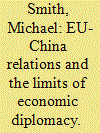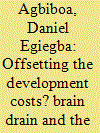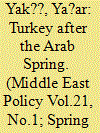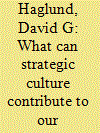|
|
|
Sort Order |
|
|
|
Items / Page
|
|
|
|
|
|
|
| Srl | Item |
| 1 |
ID:
129634


|
|
|
|
|
| Publication |
2014.
|
| Summary/Abstract |
This paper addresses a key problem in EU-China economic relations: the capacity of the EU to exert leverage through its economic diplomacy in the context of key economic trends, policy dilemmas, and processes of governance. The paper begins by identifying key elements of the EU's economic diplomacy and their relationship to key functions: deliberation, representation, communication, and negotiation. It continues by reviewing key trends and challenges in EU-China economic relations, in terms of trade, finance/investment, and broader issues of economic performance, with special reference to the problems emanating from the current economic turbulence both in the EU and in the broader global political economy. It then identifies a number of key policy dilemmas for the EU in areas such as trade defense/trade promotion, environment/development, security/commercial priorities, nvestment/sovereignty, and explores these in terms of three key concepts: orientation, coordination, and effectiveness. In pursuing this analysis, the paper relates these trends and dilemmas to attempts to govern EU-China economic relations: public/private, bilateral/multilateral, and regulatory/political. In the final section of the paper, these efforts are evaluated in the context of the EU's economic diplomacy, with relation to key actors, processes, and outcomes and to the key functions of deliberation, representation, communication, and negotiation.
|
|
|
|
|
|
|
|
|
|
|
|
|
|
|
|
| 2 |
ID:
116849


|
|
|
|
|
| Publication |
2012.
|
| Summary/Abstract |
Over recent decades global labour markets have emerged and skill shortages in particular sectors have generated an international competition for the best and brightest. The developed world is seen to 'poach' this talent from poorer countries, with the resultant 'brain drain' undermining their capacity to develop. This paper calls into question the assumption that the emigration of the highly skilled will automatically represent a loss to the country of origin. The paper positions itself between the two extremes of brain drain as constituting a pure loss or a pure gain for sending countries and calls for a more moderate approach to skilled migration and its impact on development. The paper goes beyond the simple brain drain/brain gain dichotomy by looking at the flow of the skilled within specific geographic spaces and the resultant policy dilemmas and options.
|
|
|
|
|
|
|
|
|
|
|
|
|
|
|
|
| 3 |
ID:
130937


|
|
|
|
|
| Publication |
2014.
|
| Summary/Abstract |
Turkey's attitude regarding developments in the countries affected by the "Arab Spring" varied according to the approach of the ruling Justice and Development Party (Adalet ve Kalk?nma Partisi, AKP) and its perceptions of the countries in question.
In Tunisia, Annahda, a political party that originated from the Muslim Brotherhood (MB) tradition, emerged as the strongest political movement after the fall of the Ben Ali regime. Annahda has an ideological affinity with the AKP, which also has Islamist roots. There is, in addition, a deep-rooted tradition in Tunisia to regard Turkey as a source of inspiration for various reforms. Turkey was, at the beginning of the Arab Spring, referred to by some as a role model. This concept did not acquire much content as time went by, however.
In Libya, Turkey hesitated at the beginning to get involved in the crisis and even wanted to keep NATO out of it.1 Seeing, however, that "a coalition of the willing" was going to intervene with or without Turkey, it made a swift change and participated in the operations with six aircraft and five ships.
When the mainly Shia population of Bahrain wanted to follow the example of the other Arab Spring countries and protest against its Sunni ruler, Saudi Arabia formed a Gulf Cooperation Council (GCC) intervention force, composed mainly of Saudis, and repressed the demonstrations with a ruthlessness comparable to the methods used by the ousted regimes in the other Arab countries. The international community adopted a double standard and kept silent; Turkey went along with this consensus.
Turkey's reaction to the events in Yemen was restrained; it was viewed as a distant country and of low priority on the international agenda. The fact that Saudi Arabia stepped in as the main actor may also have played a role in Turkey's lack of enthusiasm for getting involved more deeply.
|
|
|
|
|
|
|
|
|
|
|
|
|
|
|
|
| 4 |
ID:
132875


|
|
|
|
|
| Publication |
2014.
|
| Summary/Abstract |
This article reflects on application of the concept of strategic culture to supply analytical and policy-relevant guidance to those who ponder the future of security relations in the Asia-Pacific. Argued here is that, notwithstanding some obvious problems with the concept, there is utility in the application of strategic culture to the analysis of regional security challenges. To claim that strategic culture may not be equally applicable to all states in the Asia-Pacific region is not the same as saying it has no applicability at all, especially if the states to which it is applicable are important regional actors. This article suggests that both an old approach derivative of national character, and a new one associated with path dependence, might together prove fruitful for policy analysts and policy-makers alike, as they wrestle with what many assume to be the fundamental question of the coming half-century in the Asia-Pacific, namely whether a great power war in the region can be averted. Although there is much variation in the manner with which authors apply the master concept of strategic culture to their specific Asia-Pacific cases, each takes seriously the utility of a cultural approach to national strategic choice. So while the quest for reliable causality and predictive capability on a region-wide basis may remain that of the will-o'-the-wisp, there can be no gainsaying that, on a case-by-case basis, the authors show that the approach can demonstrate valuable insights into the policy dilemmas of cultural provenance and content confronting the Asia-Pacific.
|
|
|
|
|
|
|
|
|
|
|
|
|
|
|
|
|
|
|
|
|